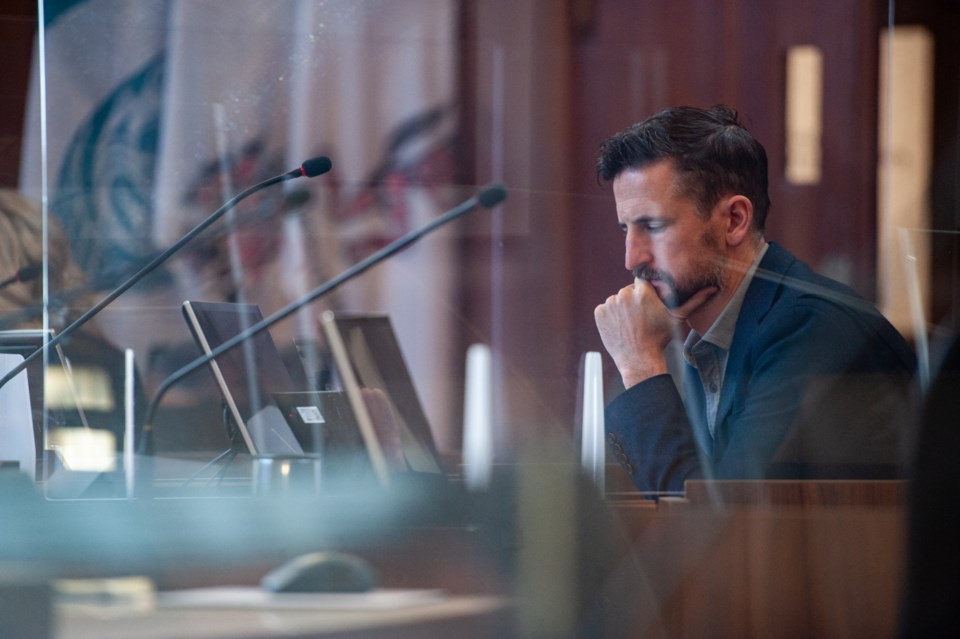A lawyer acting on behalf of 15 citizens whose legal challenge against a Vancouver city councillor was dismissed last year made another attempt Monday to argue that Michael Wiebe was in a conflict-of-interest when he voted in May 2020 for a temporary patio program.
In his appearance before the B.C. Court of Appeal, Wes Mussio focused on a section of the Vancouver Charter that B.C. Supreme Court Justice John Steeves referred to in his July 2021 ruling to dismiss the court action against Wiebe.
“This is a very distinct appeal,” Mussio told the court in his opening remarks.
Distinct in that it had to do with the interpretation of what “pecuniary interest in common with the electors of the city generally” means and how Steeves applied it in concluding that Wiebe was not in a conflict of interest.
Steeves ruled Wiebe had a pecuniary interest in common with other members of the city’s restaurant and bar owners. But he said there was no evidence that Wiebe “asserted an interest that is personal to him in the sense of being distinct from other owners of restaurants and bars.”
At the time of Wiebe’s vote in May 2020, he owned the Eight ½ restaurant in Mount Pleasant and was an investor in Portside Pub in Gastown.
Both businesses received temporary patio licences after council unanimously approved a program for bars, restaurants and breweries. The program's aim was to help offset financial losses related to pandemic-triggered bans on indoor dining.
'Onerous requirements'
Mussio acknowledged Monday — as he did during the petition hearing last year — that there were 3,127 businesses said to be eligible for a temporary patio, but argued “onerous requirements” severely limited the number of successful applicants.
As of January 2021, he noted, only 334 temporary patio permits were issued, narrowing the number of businesses given a financial advantage over competitors who were denied patios for various reasons, including no place to put a patio or located on the second floor of a building.
“So picking the 3,127 businesses and equating that to ‘electors of the city generally’ is clearly an error of law,” Mussio said.
“If that's the determination — that one or more people or businesses have a potential benefit [from a program], there will never be a conflict vote ever in city hall because it would be an absolute rare event where a city bylaw would be passed that only impacts one particular elector.”
Mussio said Wiebe wore “two hats” when he voted to approve the patio program — one as a city councillor and one as a business owner who stood to benefit financially, noting Wiebe was among the first 14 businesses to receive a permit for a patio.
'A reasonable person'
Lawyer Aurora Faulkner-Killam, acting on behalf of Wiebe, reiterated Monday several points she made during last year’s hearing, saying her client acted in good faith in voting for the patio program and that Wiebe’s competitors stood to gain from the new policy.
She also pointed out Wiebe's business interests were filed in a disclosure form posted on the city's website.
“A reasonable person would not consider a program aimed at pandemic relief available to all restaurant owners as a material conflict in the context of a pandemic,” Faulkner-Killam told the court.
“This was very early days, the world had just shut down. Similar programs were rolled out in all of British Columbia and in Canada. And it was unequivocally clear that air circulation, and getting people out of doors, was the number one most effective way of limiting the spread of the virus.”
Faulkner-Killam acknowledged Wiebe was one of the first to receive a permit for Eight ½ restaurant, but it was because he had previously submitted design work for a patio and it was on file with the city.
“So it wasn't a question of him getting any sort of treatment — special or otherwise,” she told the court. “It was simply the information that was required already existed.”
'Heavy influence from a political party'
Faulkner-Killam also took issue with Mussio’s argument that many businesses were restricted from applying for a temporary patio, saying it was “largely speculative to ask the court to draw an inference that there was something in the criteria that was self-limiting or restrictive.”
She pointed out the number of applicants had doubled in the space of time between when affidavits were filed by Mussio in court and when the proceedings began.
“There's also no evidence to suggest that there was any impropriety in how those applications were processed, either,” she said.
During last year’s hearing, Faulkner-Killam told the court the petition against Wiebe was “being brought with heavy influence from a political party.” She didn’t name the party, but several of the petitioners are either current of former members of the NPA, including president David Mawhinney.
Mussio, who became a director of the party after the court action was launched, denied the allegation in separate interviews with Glacier Media.
Justice Steeves told Mussio and Faulkner-Killam on the last day of the hearing that he would not consider the political ties to the case.
“The issues here are legal ones and they apply to any politician of any stripe — which is to say, that if any politician steps offside in terms of their conflict-of-interest constraints, then there’s ways to deal with that,” Steeves said in June 2021.
“And it doesn’t matter whether they’re right or left or pink, or whatever."
Monday’s proceeding was held via Zoom before Chief Justice Robert Bauman, Madam Justice Gail Dickson and Justice Gregory Fitch, who reserved decision on the case.
Wiebe, meanwhile, is seeking re-election this year as a member of the Green Party.
In the early days of the pandemic, he turned his Eight ½ restaurant into Side Hustle Sandwiches, of which he is no longer an owner or operator.
@Howellings



